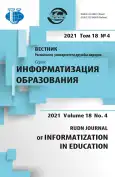Features of programming training of future teachers of informatics
- Authors: Levchenko I.V.1, Sadykova A.R.1, Abushkin D.B.1, Kartashova L.I.1, Kondratyeva V.A.1, Moiseev V.P.1
-
Affiliations:
- Moscow City University
- Issue: Vol 18, No 4 (2021)
- Pages: 337-346
- Section: TEACHING COMPUTER SCIENCE
- URL: https://journal-vniispk.ru/2312-8631/article/view/321222
- DOI: https://doi.org/10.22363/2312-8631-2021-18-4-337-346
- ID: 321222
Cite item
Full Text
Abstract
Problem and goal. The problem of identifying approaches to training in programming of future teachers of informatics in the context of technologization of modern society is considered. The aim is to determine the features of teaching programming to informatics students of pedagogical universities, as well as the formation of a system of programming languages for teaching future teachers of informatics. Methodology. To solve this problem, a range of research methods was used: analysis of regulatory documents that determine the priority tasks of education and of research and scientific and methodological publications of foreign and domestic scientists, as well as training experience in programming of informatics students of pedagogical universities; reflection of the content of the knowledge gained; identification of approaches to teaching programming for future teachers of informatics. Results. An analysis of the experience of programming teaching to students of pedagogical universities was carried out, including the personal experience of teachers, which made it possible to identify such relevant in modern conditions approaches to teaching future teachers of informatics programming as fundamental and multilevel; specifics of teaching programming, taking into account the professional and pedagogical orientation of the training of future teachers of informatics, are determined; a multilevel system of programming languages for teaching future teachers of informatics is proposed. Conclusion . In the context of the dynamically developing field of information technology and the growing interest in programming, it is important to provide school education with teachers of informatics who have competencies in the field of programming, ready to teach modern programming languages to schoolchildren.
About the authors
Irina V. Levchenko
Moscow City University
Author for correspondence.
Email: levchenkoiv@mgpu.ru
ORCID iD: 0000-0002-1388-4269
Doctor of Pedagogical Sciences, Full Professor, Professor, Department of Informatics, Management and Technology, Institute of Digital Education
28 Sheremetyevskaya St, Moscow, 127521, Russian FederationAlbina R. Sadykova
Moscow City University
Email: sadykovaar@mgpu.ru
ORCID iD: 0000-0002-1413-200X
Doctor of Pedagogical Sciences, Associate Professor, Professor, Department of Informatics, Management and Technology, Institute of Digital Education
28 Sheremetyevskaya St, Moscow, 127521, Russian FederationDmitry B. Abushkin
Moscow City University
Email: abushkindb@mgpu.ru
ORCID iD: 0000-0002-7918-3609
Candidate of Pedagogical Sciences, Associate Professor, Department of Informatics, Management and Technology, Institute of Digital Education
28 Sheremetyevskaya St, Moscow, 127521, Russian FederationLyudmila I. Kartashova
Moscow City University
Email: kartashovali@mgpu.ru
ORCID iD: 0000-0002-9499-9083
Candidate of Pedagogical Sciences, Associate Professor, Department of Informatics, Management and Technology, Institute of Digital Education
28 Sheremetyevskaya St, Moscow, 127521, Russian FederationViktoria A. Kondratyeva
Moscow City University
Email: kondratevav@mgpu.ru
ORCID iD: 0000-0001-8017-4243
Candidate of Physical and Mathematical Sciences, Associate Professor, Department of Informatics, Management and Technology, Institute of Digital Education
28 Sheremetyevskaya St, Moscow, 127521, Russian FederationViktor P. Moiseev
Moscow City University
Email: moiseevvp@mgpu.ru
ORCID iD: 0000-0002-1044-6220
Candidate of Technical Sciences, Associate Professor, Department of Informatics, Management and Technology, Institute of Digital Education
28 Sheremetyevskaya St, Moscow, 127521, Russian FederationReferences
- Levchenko IV. Development of the system of methodological training of informatics teachers in the context of fundamentalization of education (abstract of the thesis for a Doctor of Pedagogical Sciences). Moscow; 2009. (In Russ.)
- Elliott SW. Computers and the future of skill demand. Paris: OECD Publishing; 2017.
- Magana S. Disruptive classroom technologies: a framework for innovation in education. London: SAGE Publications Ltd; 2017.
- Collaborative problem solving. PISA. Results (vol. V). Paris: OECD Publishing; 2017. https://doi.org/10.1787/9789264285521-en
- Dmitrieva TA, Prutzkow AV, Pylkin AN. Two-level study of object-oriented programming by university students. Modern Information Technologies and IT-Education. 2019;15(1):200–206. https://doi.org/10.25559/SITITO.15.201901.200-206
- Druzhinskaya EV, Zaidullina SG, Isaev RR. Learning programming for Java for development android-app at the education platform Samsung it School – Ufa. Information Technology. Problems and Solutions: Proceedings of the International Scientific-Practical Conference. 2016;(1(3)):163–167.
- Levchenko IV. Professional and pedagogical activity of a teacher of informatics in the conditions of fundamentalization of education. Bulletin of the Moscow City Pedagogical University. Series: Informatics and Informatization of Education. 2008;(2(13)):39–46. (In Russ.)
- Kartashova LI, Levchenko IV. Methods of teaching information technology to primary school students in the context of fundamentalization of education. Bulletin of the Moscow City Pedagogical University. Series: Informatics and Informatization of Education. 2014;(2(28)):25–33. (In Russ.)
- Moiseev VP. Features of teaching programming when preparing bachelors of the direction “Pedagogical Education” on the profile “Informatics”. Bulletin of the Moscow City Pedagogical University. Series: Informatics and Informatization of Education. 2014; (4(30)):28–32. (In Russ.)
- Kondratyeva VA. Teaching the basics of programming in the Python language in the school computer science course. Bulletin of the Moscow City Pedagogical University. Series: Informatics and Informatization of Education. 2021;(1(55)):8–16. (In Russ.)
- Kondratyeva VA. Features of teaching artificial intelligence in basic school using the Python programming language. Open Science 2021: Collection of Materials of the Scientific Conference with International Participation. Moscow: Aegitas Publ.; 2021. p. 248–254. (In Russ.)
Supplementary files









